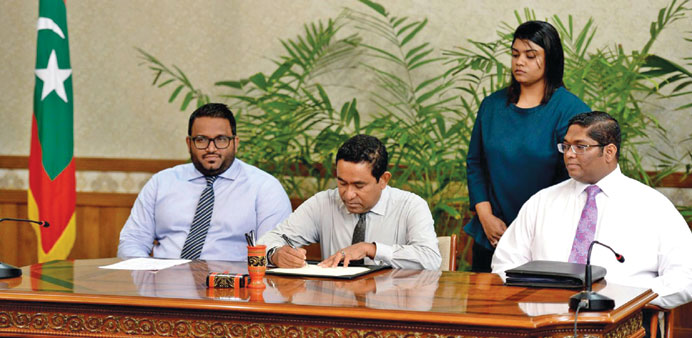President Yameen ratifies the land agreement in Male.
Reuters/Male
The Maldives ratified legislation yesterday to allow foreigners with investment of more than $1bn to own land despite opposition concern the reform could be used for military expansion in the islands by China.
The legislation, passed with 70 assembly members in favour and 14 opposed, will allow foreigners to own land within a project site on condition at least 70% of the area is reclaimed from the sea.
The constitution had earlier had prohibited the foreign ownership of any part of Maldivian territory, instead allowing only 99-year leases.
Only 10% of the existing 298sqkm of the Maldives would be given to investors to develop more reclaimed land under the amendment.
The reform is expected to attract offshore investors into special economic zones introduced by president Abdulla Yameen to diversify the economy away from the dominant tourism sector.
The opposition Maldivian Democratic Party (MDP) was divided on the bill with 10 members voting for it and 10 against. The party said the legislation could give “unprecedented access to foreign parties to operate in the Maldives”.
“Recent bilateral visits and diplomatic interactions clearly suggests this is sweetener for China,” Eva Abdulla, an MDP legislator who voted against the legislation, told Reuters.
“Maldives is not in the South China Sea. This situation paves the way for greater Chinese involvement in Indian Ocean affairs. We are now witnessing robust Chinese presence in the Indian Ocean and that is what this government is facilitating.”
However, the president told a news conference the Maldives had assured India and other neighbouring countries that it would keep the Indian Ocean a demilitarised zone.
In September last year, during a visit by Chinese President Xi Jinping, the Maldives signed a deal with a Chinese company to upgrade its international airport after cancelling a $511mn deal with India’s GMR Infrastructure in 2012.
The Maldives recently signed up to two Chinese initiatives: an Asian Infrastructure Investment Bank (AIIB) and a so-called Maritime Silk Route.

